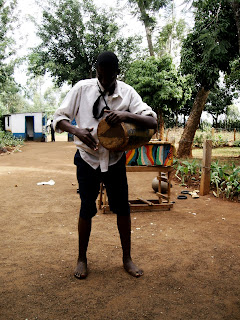This weekend I got to meet one of my future classmates, Shamim Okolloh. She invited David and I to an alumni event she organized at her former high (secondary) school, Kiamosi GBS. The event was the first of its kind for the school. As an all-girls boarding institution, the environment was special becasue it represented a place that understood the importance of educating women. Kenya, like most countries in the world is still a patriarchal society. Men hold the majority of the power and women are working much harder to ensure that they are viewed as equals.
Shamim organized this event to bring the alumni, which they affectionately labeled as the "old girls," back to the school to show the current students that academic success and achievement in any career is possible. All of the "old girls" were called to the stage, and one-by-one they stated:
1. Their name
2. The name of a memorable teacher
3. The dormitory they lived in while attending the school
4. Their current career
The impact that each "old girl's" words had on the 1200 or so students present was immeasurable. Students would cheer as they identified with old girls based on the dorm they stayed in, or some of the more memorable teachers. And announcement after announcement about each old girl's career created a wave of "ooohs" and "ahhhs" throughout the crowd of students. The younger girls seemed to be very impressed by some of the positions held by the old girls. I heard various job positions including banker, flight attendant, executive, principal, and even independent business owner. It truly was empowering for the students to understand that they could do these things some day.
Of course when you give a microphone to an educated, successful person and ask them to talk about themselves you're bound to hear more than the required remarks; and with approximately 40 old girls on the stage, the words of encouragement and empowerment flowed like the Webuye Falls. I tried my best to record it all, but I was only able to isolate three memorable quotes (where's my legal pad when I need it?...thanks for backing me up iPhone):
" If you want to test the fruits of this country, you should work hard"
-Former Kiamosi student
" The beauty of being a woman was once being a girl"
-Former Kiamosi student
" The tragedy of life is not when we die. The tragedy is what we let die when we live"
-Principal, Kiamosi Girls School
The young ladies of Kiamosi were eager to show their appreciation for this special event. To commemorate the occasion, the school's dance team put on a very special performance.

The dance was accompanied by singing that created a sort of dialogue between the groups on stage. I guess you could have called it a musical.
Even though I couldn't understand a word of what was being said (because I'm still learning Kiswahili), I thoroughly enjoyed the performance and found myself amazed at how talented these young women were.
The program ended with a special awards ceremony that honored teachers and students who were performing well. The top students in forms 3 & 4 received money to help pay their school fees. You would have thought these girls had won the lottery when they heard this. When I did the conversions I figured out that it costs these girls around $335 per year to attend this boarding school (that's food, a room, and school supplies). It didn't seem like a lot to me, but I had to keep telling myself that in Kenya, that's quite a bit of money. I think I understand now why Oprah chose to start a school in Africa. For a lot less money you can make a much greater impact on a child's education. The children here view an education as one of the only means of success, and so they literally give everything to ensure that success.
I had to let Shamim know how much of an impact this day had on my life. The ceremony was received with great appreciation and it served to empower those girls beyond any educator's wildest dreams. Talking with the students afterward helped me to understand that seeing those older women on the stage and hearing about their successes meant much more than your average school assembly. It helped create a beacon of hope, guiding those young ladies to the futures they now understood that they could attain through a little hard work and dedication. When that ceremony was over, you could feel the energy in the room as if lighting had just struck the area. There was hope, there was adoration, and there was a sense of heightened self-esteem. It's amazing how the power of community and unity can motivate a determined generation.














































